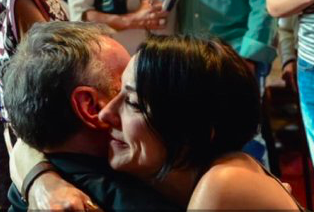
BY: ROBIN LY
Toronto’s Recollectiv is not your typical musical troop.
It is a group where people living with conditions such as dementia, post-traumatic stress disorder (PTSD), acquired brain injury (ABI), Alzheimer’s or Parkinson’s disease can come together to create and experience music.
But it’s also about improving group members’ quality of life, what Recollectiv’s founder, Ilana Waldston, says is about, “Rediscovering joy by making music.”
Waldston’s mother lives with dementia – and like others living with chronic conditions – her mother spends a lot of her time with doctors, social workers, and other professionals.
“[My mother] was a very vibrant, active woman,” Waldston said. “As her disease progressed, she lost so many of the activities she loved … singing [is] one of the few things left we can share that makes us both happy.”
Waldston sees Recollectiv as a way for individuals to focus on what they can do, as opposed to what they have lost.
“The main takeaway of Recollectiv [is to] touch others’ lives through group music making, something so fundamental and universal that elevates everyone’s quality of life,” Waldston said.
Recollectiv is inspired by the California band The 5th Dementia, created by couple Carol and Irwin Rosenstein.
Irwin Rosenstein, who practised real estate law, lives with Parkinson’s and early dementia. After his diagnosis, the couple realized Irwin Rosenstein’s memory, energy, and well-being improved when he played and taught music to others. This is backed by research, music therapy alters the chemistry in the brain by stimulating the release of dopamine, which effectively increases energy and improves mood.
In addition to The 5th Dementia, the couple created the non-profit MusicMendsMinds (MMM) whose mission is to support the mind and spirit of those affected by neurological disease, cognitive decline, and PTSD through musical groups. There are currently nine MMM affiliated bands in the U.S., mostly based in California, with other bands forming in the Philippines, other U.S. states, and the organization has been a supportive partner with Recollectiv.
The organization has also inspired a documentary, to be released this summer:
Back in Toronto, Waldston says finding activities for her mother has been difficult.
A trip to the symphony, an outing both Waldston and her mom previously loved, became challenging when her mother began to sing or talk along with the music, something generally not appreciated by fellow audience members.
It’s that stigma and feeling of non-belonging surrounding neurodiversity that Recollectiv hopes to neutralize in the future.
“I want [the public] to realize that people with cognitive challenges are just like them; they deserve to feel good about themselves, have friends around them who care and, above all, have some fun,” Waldston said.
Waldston hopes Recollectiv, which is a project of Smile Theatre Company, can lead to the creation of new groups and communities where people can access support and share a joyous activity together.
“I have lived long enough to know that life is short and unpredictable,” Waldston said. “You can’t fix a lot of things that cause people pain but if you can bring happy moments back into their lives, that’s a huge achievement.”
Recollectiv will meet in Central Toronto on Saturday afternoons in an accessible and barrier-free location. There is no cost for participation, and anyone who wants to sing and or play an instrument, regardless of any physical or neurological diversity, are welcome to join.





